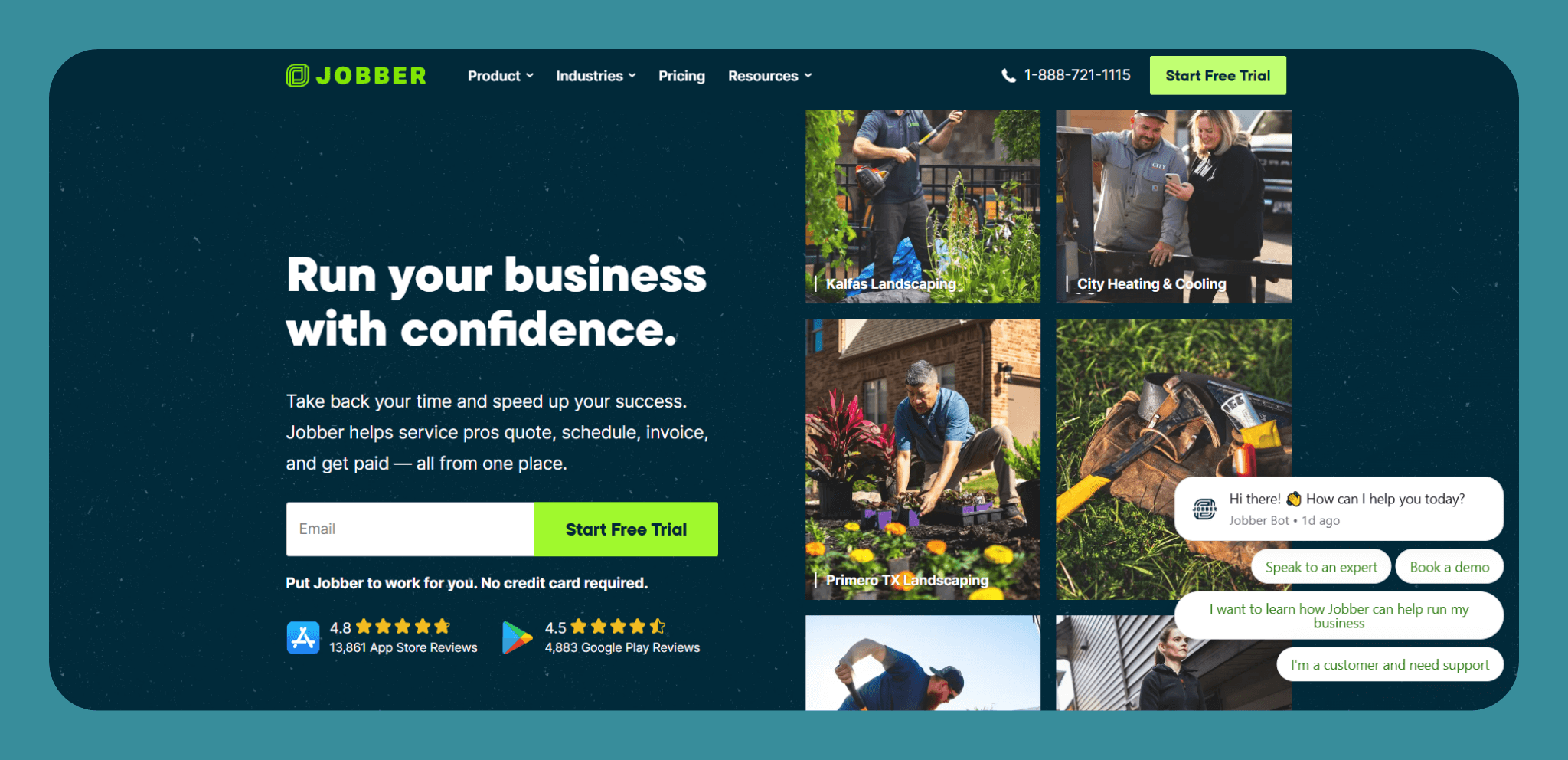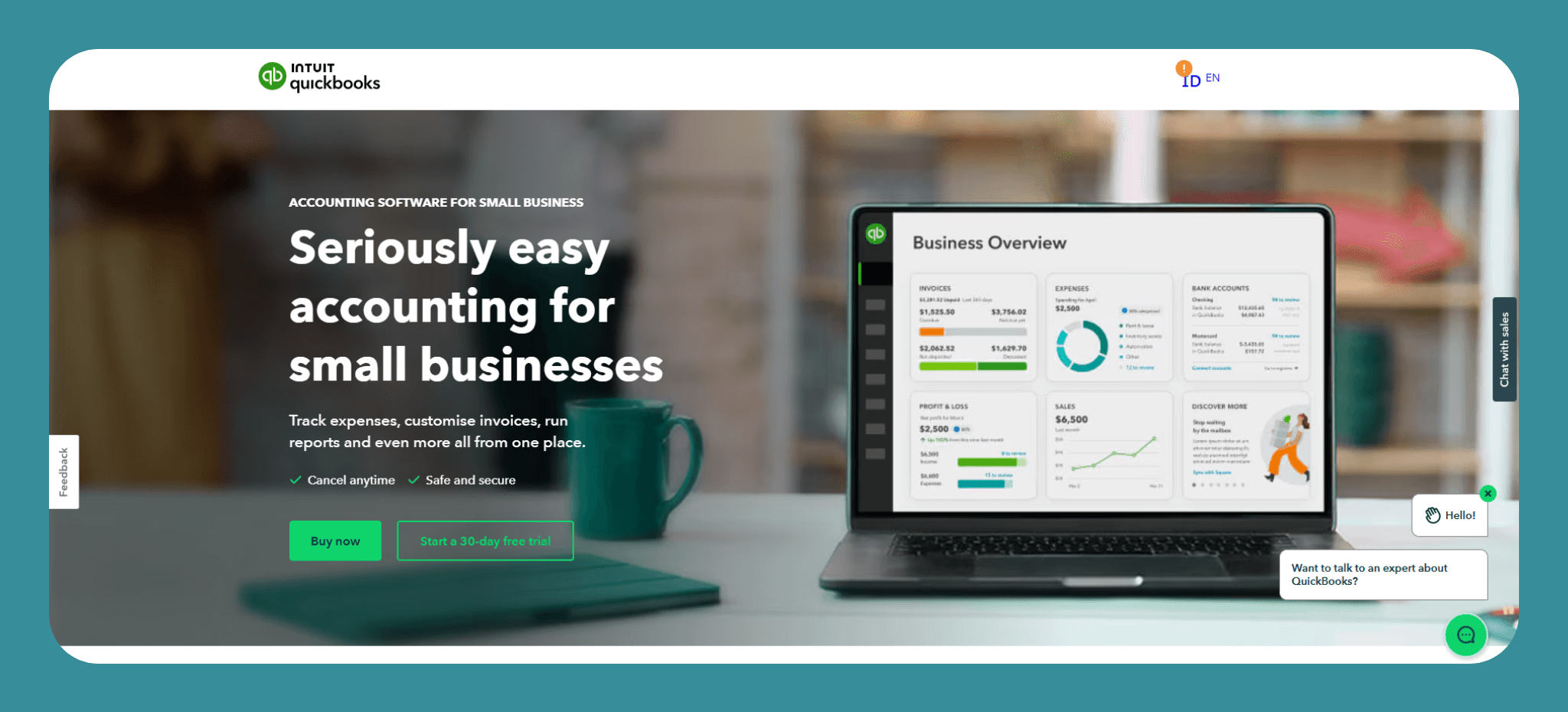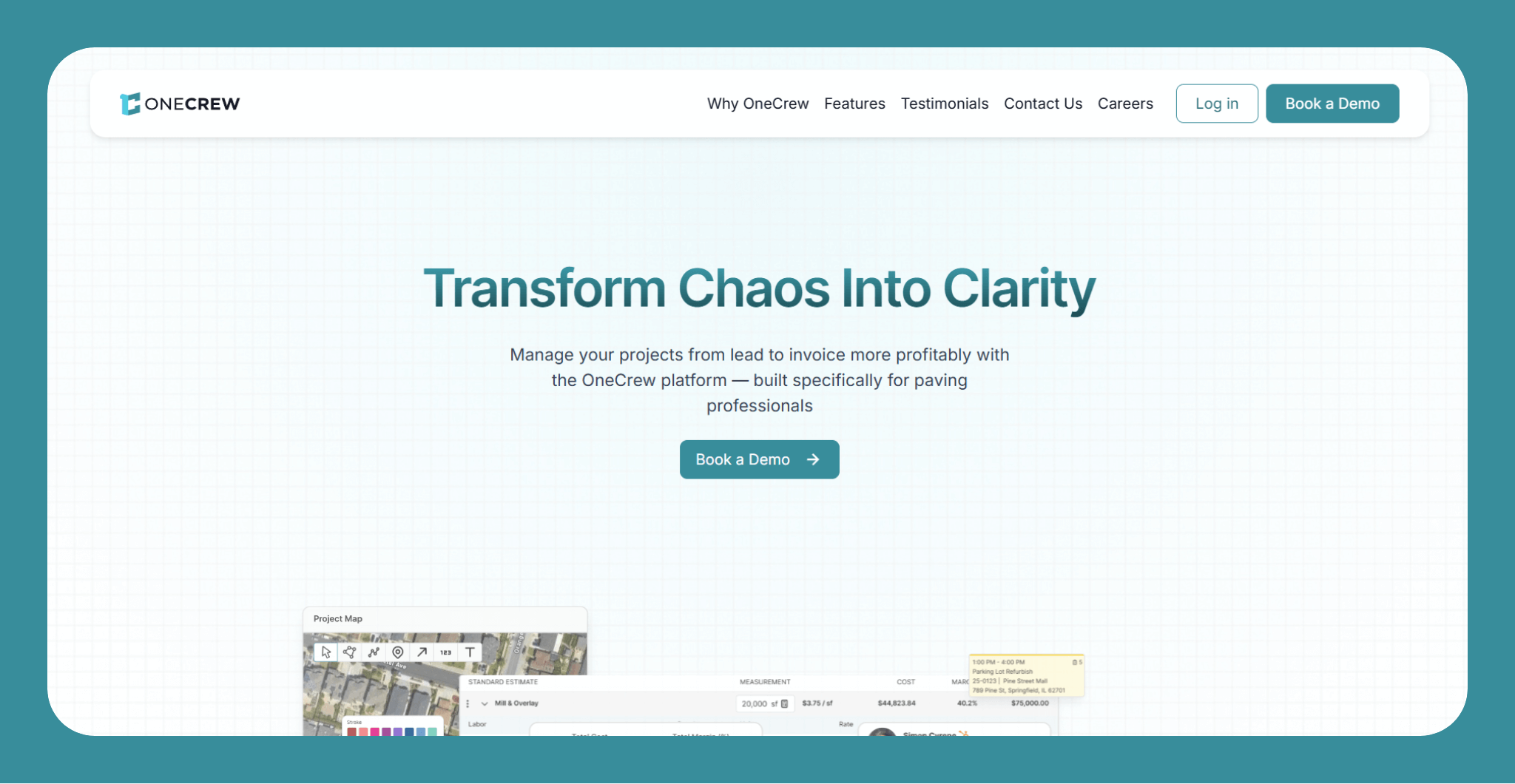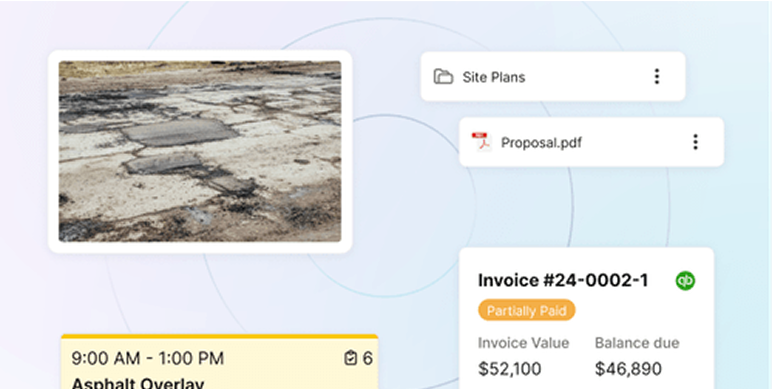Jobber vs. QuickBooks vs. OneCrew in 2026
Which platform truly fits paving contractors who need to manage everything from estimates to invoices?
Imagine bidding on a parking lot, assigning crews, and monitoring job costs, all from one dashboard.
QuickBooks handles accounting flawlessly, Jobber simplifies scheduling for small teams, but OneCrew was built specifically for paving contractors, tying together estimating, crew coordination, and client interaction.
Our Jobber vs. QuickBooks vs. OneCrew comparison breaks down what sets them apart and helps you pick the right tool.
Jobber vs. QuickBooks vs. OneCrew: What’s the Difference?
The biggest difference is that Jobber focuses on day-to-day task management for service businesses. QuickBooks handles accounting and payroll, but not operations. OneCrew brings everything together for project-based paving contractors, from takeoffs to job costing.
Jobber
Jobber is basically the generalist alternative for service businesses. If you're running a small business around town doing landscaping, window cleaning, or general repairs, it keeps your schedule and customers organized.
QuickBooks
QuickBooks is an accounting program that helps businesses manage invoices, expenses, payroll, and taxes. It’s widely used by small and mid-sized companies across industries for financial reporting and bookkeeping.
OneCrew
OneCrew is a platform designed specifically for asphalt and concrete contractors managing project-based jobs. It covers every step from lead to invoice, including PDF plan takeoff, blueprint measurement, crew assignments, and customer communication.
Which one should you choose?
- Pick Jobber if you're mostly doing quick jobs with small crews; think home and field services or owner-operators, not building parking lots from scratch.
- Choose QuickBooks if you need built-in accounting or payroll tools and integrations with your accountant or CPA.
- Choose OneCrew if you're the type of contractor who gets handed a stack of blueprints and needs to figure out exactly how much asphalt and labor it'll take to get the job done.
Jobber vs. QuickBooks vs. OneCrew: Quick Comparison
Meet Jobber: Features and Highlights

Jobber is a field‑service focused app built to help small to mid‑size teams manage scheduling, client communication, quotes, invoicing and payments.
You get drag‑and‑drop calendars, GPS and route assistance, automated reminders, a client portal for quote approvals and payments, plus built-in job costing and QuickBooks Online sync capabilities.
Jobber includes CRM-like functionality: Detailed client profiles, past work history, and two‑way texting via the client hub. You can create professional quotes that convert into scheduled jobs, accept payments instantly, track labor and materials, and pull reports on profitability, revenue trends, and team performance.
Meet QuickBooks: Features and Highlights

QuickBooks is the go‑to accounting platform for small businesses. It lets you run your books with professional invoices, expense tracking, bank feeds, payroll (or integrations with payroll tools), and inventory control on Plus plans.
You can set recurring invoices, send payment reminders, upload receipts via mobile app, reconcile bank accounts with automation, and generate standard reports like profit & loss, balance sheets, and cash flow.
Recent upgrades include AI agents that can automate everyday bookkeeping tasks (payments, categorization, reports), saving businesses up to 12 hours per month.
Meet OneCrew: Features and Highlights

OneCrew is a purpose‑built platform for asphalt and concrete contractors running project‑based work. It’s not a general field service app; it’s built to handle plan-based estimating from PDFs or blueprints, crew coordination, customer approvals through an online portal, and margin-first pricing workflows.
You manage job sites, material quantities, labor scheduling, and invoicing in one place. The client portal allows customers to view and sign proposals, view/pay invoices, upload photos or documents, and chat message your team.
OneCrew integrates with QuickBooks Online for invoicing sync. It’s ideal for paving contractors of any size, especially mid‑ to large‑sized crews focused on asphalt and concrete project workflows.
Jobber vs. QuickBooks vs. OneCrew: Feature‑by‑Feature Comparison
Jobber: Scheduling and dispatching
- Surface strengths: You can drag jobs around on a calendar, plan routes so your crews aren't zigzagging across town, and send automatic reminders so customers actually show up.
- Deeper insight: Real-time GPS and routing reduce fuel/time waste; clients see appointment details. Light automation reduces double-bookings, great for service-style jobs, though not built for multi‑crew project coordination.
QuickBooks: Scheduling and dispatching
- Surface strengths: QuickBooks doesn't do scheduling at all; it's purely about the financial tasks.
- Deeper insight: Scheduling functions would require third-party integrations or separate apps; they’re not native. QuickBooks is better than some accounting-only tools, but it’s not a competitor for Jobber in terms of dispatching.
OneCrew: Scheduling and dispatching
- Surface strengths: Built for project job coordination; schedules crews across project timelines, handles change orders, and lead-to-invoice workflows.
- Deeper insight: Tailored to paving contractors managing multiple crews and tasks, but does not offer live crew GPS tracking or mobile field service mapping like Jobber. It focuses on project-based jobs with team visibility via task phases and crew coordination.
Winner: OneCrew
If you’re managing multi-crew paving projects, OneCrew is the strongest option overall.
Jobber: Quoting and invoicing
- Surface strengths: Jobber lets you build custom quotes with optional add-ons, and then you can convert those quotes to scheduled jobs or invoices in one click. Payment options include ACH, credit cards, and Jobber’s mobile card reader.
- Deeper insights: Perfect for simple jobs where you can eyeball the work and give a quick quote. But if you need to measure square footage from blueprints or price out a three-phase parking lot project? Look elsewhere.
QuickBooks: Quoting and invoicing
- Surface strengths: You can send invoices, accept payments, set up recurring billing, and customize templates. Quotes are available on most plans, with partial payment tracking and mobile approvals.
- Deeper insights: QuickBooks quotes work well for fixed-scope proposals but don't support measurement-based or project-driven estimating. There’s no pre-built workflow from quote to job execution. It’s a strong billing engine, not a project sales tool.
OneCrew: Quoting and invoicing
- Surface strengths: OneCrew lets you upload those PDF plans the architect gave you and actually measure everything digitally. No more walking around with a measuring wheel trying to figure out how much material to order.
- Deeper insights: Built for paving contractors who bid from blueprints or maps. Highly configurable estimate templates and fast bid turnaround. Customers can approve, sign, and pay via the portal. Clear edge over service‑focused apps and a strong competitor to QuickBooks when paired with accounting.
Winner: OneCrew
It’s the only platform here purpose-built for blueprint-based estimating and proposal management.
Jobber: Crew and job management
- Surface strengths: Jobber allows basic crew assignments, time tracking, and notes per job. Technicians can check in, log time, upload photos, and complete tasks via the mobile app.
- Deeper insights: Great for small teams doing one job at a time. But not made for complex workflows (e.g., overlapping crews, subcontractors, or multi-day projects). Limited visibility into job stages or cost-to-complete tracking.
QuickBooks: Crew and job management
The platform is purely financial. You’ll need a separate app if you want to manage jobs or assign field crews. It’s not a field ops tool; this is where even a basic Jobber alternative beats it.
OneCrew: Crew and job management
- Surface strengths: Built for project timelines. Assign multiple crews, track stages, and view real-time updates across locations. Each job includes tasks, roles, materials, and attached documentation.
- Deeper insights: Includes proposal-to-invoice visibility, with synced schedules, margin targets, and real-time project data. Doesn’t track crews live via GPS, but gives back-office and sales teams full clarity on project status.
Winner: OneCrew
Jobber’s crew management is simple and useful for short jobs, but OneCrew gives you the tools to manage entire projects, multiple crews, and big scopes. QuickBooks doesn’t even compete here.
What Real Users are Saying
Here's what actual contractors are saying about these platforms. The good, the bad, and the frustrating:
Jobber pros
- Customer support excellence: A Trustpilot reviewer noted that customer support is excellent and responsive, with well-integrated features. They explained that scheduling, quoting, and billing function effectively, and payment collection is handled within the app. (July 30, 2026)
- Professional appearance and efficiency: A G2 user mentioned that all features and functions are simple and straightforward. They found the initial setup very easy, and connecting with their accountant for QuickBooks integration appeared straightforward. (October 23, 2024)
- Strong mobile capabilities: A Capterra user stated that they particularly appreciate the mobile app, which allows them to manage everything while traveling. (June 2, 2026)
Jobber cons
- Limited support hours: A Trustpilot reviewer complained that they discovered technical support is only available until 4:30 p.m. Mountain Time, which is problematic since their workers operate until 5–6 p.m. and they need help with route optimization. (July 29, 2026)
- QuickBooks integration issues: A G2 reviewer mentioned several dislikes: the inability to create change orders for current jobs, the high monthly platform cost, and problematic QuickBooks sync that forced them to manage QuickBooks manually. (July 28, 2026)
- Platform instability and performance issues: A Trustpilot user reported that the platform has declined from a solid 4-star experience to 2 stars at best over recent months. They've been unable to reliably access invoices and payments for several weeks due to update rollouts that prevent data loading on desktop computers. (May 22, 2026)
QuickBooks pros
- User-friendly interface: A G2 reviewer noted that they use QuickBooks daily for invoice generation and progress billing for their metal building clients. It's easy to use even for non-tech-savvy team members, with simple setup and integration that works smoothly with their workflow. (July 25, 2026)
- Bank integration and automation: A Capterra user highlighted that they appreciate how QuickBooks Online automatically tracks bills and expenses. Bank and credit card account connections allow for automatic expense categorization and easy invoice creation and tracking. (July 21, 2026)
- Real-time financial information: Another Capterra reviewer mentioned that the platform syncs bank accounts to provide real-time financial information and simplifies transaction matching across accounts. (July 2, 2026)
QuickBooks cons
- Frequent unwanted updates: A Capterra reviewer complained that the platform frequently updates its appearance and organization, and just as users adapt to changes, new updates are released. This disrupts workflow and reduces productivity while learning the updated interface. (July 2, 2026)
- High cost and poor value: Another Capterra reviewer said that the cost is not competitive and the product is significantly inferior to desktop versions. They estimate desktop users switching would pay at least 100% more for an inferior cloud-based product. (March 3, 2026)
- Frequent price increases: A Capterra user expressed frustration with frequent cost increases. They view Intuit as having a monopoly and passing costs onto business owners. (April 18, 2026)
How to Make Your Choice
Choosing between Jobber vs. QuickBooks vs. OneCrew depends on the kind of work you do. If your jobs are quick and repetitive, the answer will be different than if you’re managing multi-day projects, crews, and estimates built from blueprints.
Jobber is better for:
- Solo contractors or small teams doing recurring service work
- Teams that need to keep track of who's going where and when without getting buried in project management complexity
- Contractors who want something simple that won't confuse their crews or require a training manual
- Users looking for affordable Jobber alternatives to larger tools like ServiceTitan
QuickBooks is better for:
- Contractors who already have a field operations solution and just need accounting
- Teams focused on payroll, tax reporting, and financial insights
- Businesses that need recurring billing or bookkeeping, but not crew coordination
- Anyone needing a reliable platform that’s still better than QuickBooks competitors for small business accounting
OneCrew is better for:
- Paving, asphalt, or concrete contractors managing project-based jobs
- Companies that estimate from blueprints, plan with site maps, and assign crews, materials, and equipment
- Growing businesses ready to upgrade from Jobber or other general field service tools
My Verdict
Look, if you're bidding real paving projects, the kind where you need to know exactly how much material to order and which crew goes where, OneCrew is built for that. The others aren't. QuickBooks handles your books. Jobber handles simpler jobs.
But if you need to quote from site plans, manage real crews, and track your numbers in real time, you need a platform that does more. That’s what OneCrew is built for.
Run Jobs, Crews, and Quotes in One Place
When comparing Jobber vs. QuickBooks vs. OneCrew, it’s about who fits how you run your work. Jobber is great for quick service jobs. QuickBooks is great for books. But if you’re estimating from plans, assigning crews, and managing real projects? That’s where OneCrew comes in.
OneCrew was built for project-based paving and concrete contractors. It replaces the patchwork of tools that slow you down. Here’s what you can do with OneCrew:
- Estimate from PDFs or maps using labor, material, equipment, and sub-line items
- Assign crews and roles to specific job phases for better clarity and accountability
- Track project status with real-time updates across pre-construction, production, and billing
- Work with customers through a portal for approvals, payments, and shared documents
- Sync financials with QuickBooks to keep invoicing and payments organized
You don’t need five different apps to run your business. You need one platform that ties it all together. Book a free demo with OneCrew and take control of your jobs from start to finish.
FAQs
1. Can Jobber replace QuickBooks?
No, Jobber can’t replace QuickBooks. Jobber handles scheduling, quoting, and client management, but you’ll still need QuickBooks or another accounting tool for financial reporting, taxes, and payroll.
2. Does Jobber do payroll?
No, Jobber does not include payroll. Jobber keeps your jobs organized, but come tax time, you'll still need QuickBooks (or similar platforms) to handle the accounting side. They work together; they don't replace each other.
3. Which QuickBooks competitor is better for crews?
For managing crews, OneCrew is a better option than QuickBooks. QuickBooks is built for accounting, not job scheduling or crew assignments.
4. Can OneCrew integrate with QuickBooks?
Yes, OneCrew integrates with QuickBooks Online. The integration syncs invoices and payment data, so your accounting stays clean while you manage operations inside OneCrew.
5. Do I need both Jobber and QuickBooks?
Yes, in most cases you’ll need both. Jobber manages jobs and customer tasks, but you’ll still need QuickBooks to handle your accounting and payroll.


